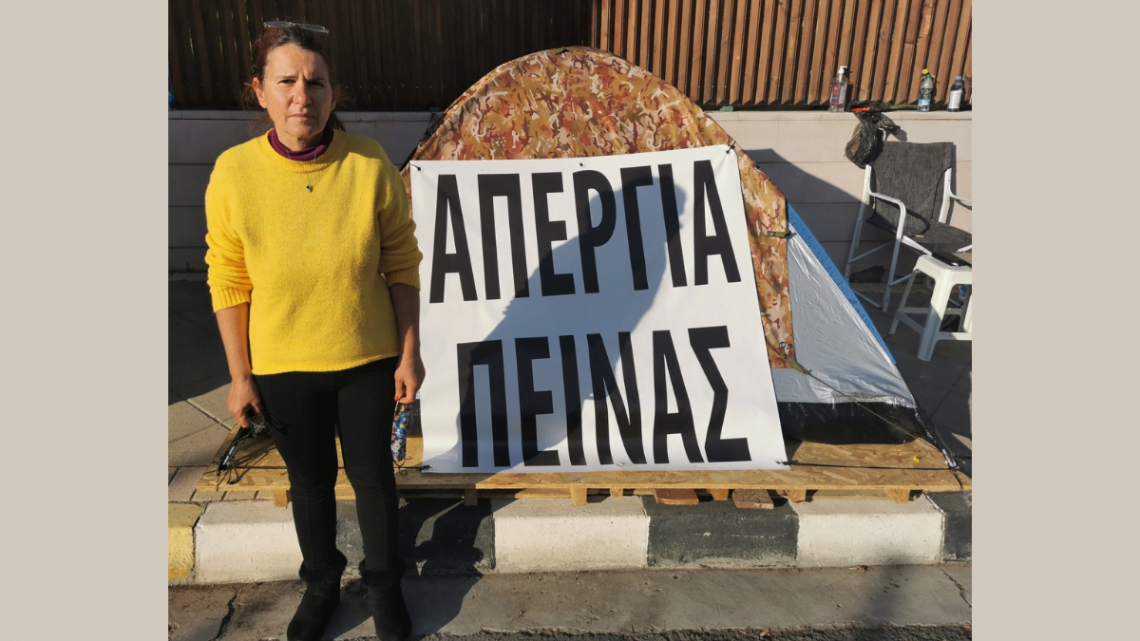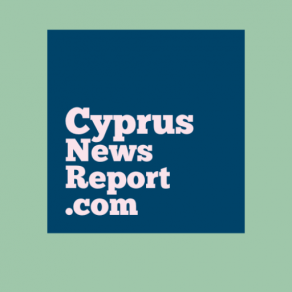Weak, Dizzy But Resolute - Maria Karaoli’s Hunger Strike Enters 14th Day
January 3, 2021Maria Karaoli-Kleanthous entered her 14th day on hunger strike feeling weak and dizzy but determined to achieve her goal of petitioning the authorities to find a solution to her family business’ financial woes.
Mrs. Karaoli has been camping outside the Presidential Palace for two weeks, raising concerns about her health and safety.
“My husband is a doctor, he comes often to check on my symptoms. I felt very weak but managed to gather my strength,” she tells CyprusNewsReport.com.
For the time being, Mrs. Karaoli has friends camping with her for safety, as a woman alone on the street faces considerable risks.
Hunger strike
Hunger strikers in good health are not in danger of dying for the first six to eight weeks, according to The Lancet. Provided the hunger striker takes fluids, malnutrition, debilitating weakness and death can be staved off for a couple of months.
But in two weeks from now, Mrs. Karaoli faces serious health problems, including organ failure, loss of vision and hearing. So, what drives this slightly-built middle-aged woman to make such a strong protest?
“They told me they have no problem evicting my special needs son and my elderly father.”
Maria Karaoli.
Making a stand
Mrs. Karaoli set up camp outside the Presidential Palace’s gates on Christmas Day to save her construction business and prevent the Bank of Cyprus from evicting her family from their homes.
Like many other construction companies, the family business was left exposed during the 2013 financial and economic crash. After running into trouble they started negotiating with the Bank of Cyprus to settle their 13-million-Euro loan. By 2017, they had reached an agreement to sell some property worth 12 million Euros plus another one million in other properties, she said.
“I have this agreement, it came by email,” said Mrs. Karaoli.
“They invited us on Monday to sign the restructuring agreement at 4pm. At 10am on Monday, their receiver entered our office and foreclosed on our entire business,” she adds.
“Over the weekend, when they realised we had found a buyer after a lot of effort on our side, they decided they didn’t need us anymore. The receiver, Michalis Avraam, stepped in to do the sale and arrange the transfer…The banks employ him to destroy companies,” she said.
“They froze assets worth much more than the loan,” added Mrs. Karaoli.
Cyprusnewsreport.com reached out to Michalis Avraam, the receiver.
“It’s my hope that in the new year, the parties will reach a resolution. I sympathise with Mrs Karaoli but the facts are not as simple as they appear,” he said.
Dispossessed
But to Mrs. Karaoli it is simple. The family’s fortune was taken over by the Bank of Cyprus’ receiver and to add to the family’s woes, she says she was told that they had no problem evicting her special needs son and elderly father, who are living in their family home but face a precarious future.
“My son is 32 and autistic, he has complicated special needs and the cost is over 4000 Euros per month for various needs. Some of the expenses are covered by the state but I have to cover the rest. My father is 81,” says Mrs. Karaoli.
Calls to Bank of Cyprus were not immediately returned.
Long-drawn out legal battles
Mrs Karaoli attempted to deal with the matter legally but this brought problems of its own.
“Our lawyer had a conflict of interest because he also had cases for the Bank of Cyprus, so I found another one and I hope we can reach a resolution to end this nightmare,” she adds.
No sympathy
“I know many other people on the edge who face foreclosures and destroyed businesses. They came to talk to me and cry with me. They support me but there is no interest or sympathy from the authorities, the banks or the Presidential Palace. They sent me from one person to the next,” says Mrs. Karaoli.
The company lost the majority of its employees.
“My father always treated his employees generously and shared the company’s profits with them, but now the bank has ruined our business,” she says.
Mrs. Karaoli swears she will camp outside the Presidential Palace until her case is heard and something is done to reach a fair resolution.
Predatory lending
“The bank did not deal with our case in good faith or follow EU rules. The banks in Europe have to follow 100 rules to restructure loans, but in Cyprus they do whatever they want,” says Mrs. Karaoli.
However, new banking laws were passed in 2015 with the express purpose of assisting companies with loans to avoid the worst consequences of the crisis. These laws include restructuring rules, interest rate write-downs and other common sense approaches to vulnerable but viable companies.
In the case that a bank takes over more than the value of the loan, it falls under predatory lending which is illegal in the EU. Mrs. Karaoli says that the bank and administrator also added hundreds of thousands of Euros in legal fees, an amount that she disputes.
Since the business negotiated to reach a loan settlement and found a buyer, there appears no reason for the family’s other assets to be frozen - the strategic defaulter argument doesn’t stand.
Destroying businesses by forced liquidations or disorderly wind-downs are also counter productive to the economy at a time when jobs are desperately needed. Other businesses face similar treatment by the banks, meaning deep wounds to the economy’s resilience.
Cascade of ethical issues
There is a literal cascade of ethical and legal issues in this case, particularly from the bank’s side. These questions remain unanswered because Bank of Cyprus has not returned our phone call to inquire their side of the story.
Was the company under official receivership when the bank stepped in? Receivership and winding down a company requires the signatures of the directors. Is the company under forced liquidation, administration, debt mediation or what? The picture is not clear.
Did the bank do everything possible to restructure the loan fairly, particularly when it came to high interest rates? The Central Bank of Cyprus’ Arrears Management Directive of 2015 provides for multiple solutions to distressed company debtors.
Did everyone involved put the interests of Mrs. Karaoli’s autistic child as a priority?
Isn’t it a conflict of interest that the Cyprus state is a majority shareholder in Bank of Cyprus and at the same time the state would be responsible for ensuring a fair playing field for the consumers of banking services?
Did the bank follow in good faith the restructuring rules laid out by the European Central Bank?
In related developments, it’s a mystery to Mrs. Karaoli that nobody from the state media has appeared to cover her story.
“I called RIK many times, they said nobody was available because of the holidays,” she says.
“The rights of the Europeans are legal interest rates and many other protections. I will stay here until they give me a solution,” she says.
Bigger picture
The bigger picture is business sentiment. Confidence in the economy cannot be solid if the banking sector is seen to be taking advantage and profiteering from business’ vulnerabilities during crises. Cypriot banks are notorious for charging high interest rates and hidden costs and have made little to no effort to rectify this impression, all the while decrying non-performing loans.
Decision after decision against the biggest banks for misleading mortgage contracts, overcharging, hidden charges and other predatory lending behaviours have come out from the Consumer Protection Service and Financial Ombudsman, yet it continues.
The construction industry carries higher risks than many other industries, but this should only mean that innovative approaches should be taken. The construction industry is a key part of the economy.
Dispossessed
Long cold and lonely days lie ahead for Mrs. Karaoli with nothing to look forward to except a dim hope for rescue from lenders and authorities who have turned a blind eye.
Debt problems have pushed Mrs. Karaoli into believing that she doesn’t have anything left to lose except her dignity and her life. One can only hope that her inner strength and some miracle carries her and her family to the other side of their problems.
Editor’s note: This is Mrs. Karaoli’s interview, we will be attempting once again to contact Bank of Cyprus to get their side of the story.






